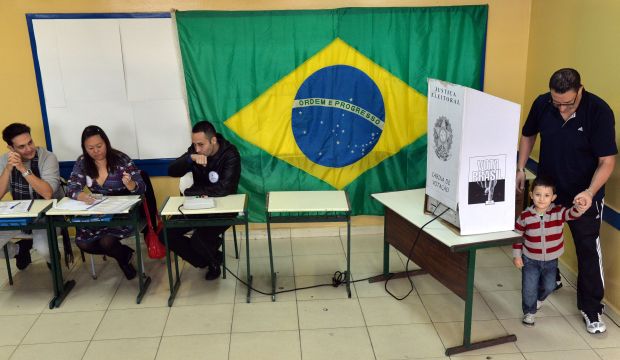
A man leaves the polling booth after casting his vote at a school in São Bernardo do Campo, south of São Paulo, Brazil, on October 5, 2014. (AFP Photo/Nelson Almeida)
Rio de Janeiro, Reuters—Voters across Brazil were casting ballots Sunday in the most unpredictable presidential election in decades and the first since the end of an economic boom underpinning the leftist Workers’ Party’s 12-year rule.
As President Dilma Rousseff seeks a second term, voters are weighing whether the socioeconomic gains of the last decade are enough to reject the candidacies of a popular environmentalist and a pro-business social democrat, who both promise to jump-start the economy after four years of lackluster growth.
Polls show Rousseff as the front runner in a race that is likely to go to a runoff on October 26, following one of the most competitive campaigns since Brazil returned to democracy in 1985. The death of one candidate, the unexpected surge of another, and fierce marketing by Rousseff to claw back into the lead have contributed to a nail-biter election as uncertain as the course of the country itself.
“It really is too close to call,” said Rafael Cortez, a political analyst with Tendencias, a consultancy in São Paulo. “Volatility and frustration favor opposition candidates, but you don’t really have a crisis to topple the government, either.”
Rousseff’s main rivals are Marina Silva, a hero of the global conservation movement and ruling party defector now with the Brazilian Socialist Party, and Aécio Neves, a senator and former state governor from the centrist party that laid the groundwork for Brazil’s economic boom last decade.
At mid-day, voting was proceeding without major problems, from densely populated southern cities to remote Amazon villages.
Rousseff, wearing the Workers’ Party’s signature red, voted shortly after polls opened in the southern city of Porto Alegre, where she lived and rose in the state bureaucracy in the 1990s. Silva voted in the Amazon state of Acre, where she was born into a family of poor rubber tappers, while Neves cast his ballot in Belo Horizonte, the capital of the southeastern state he governed before serving in Brazil’s Senate.
The two opposition candidates, in a last-minute sprint for runner-up, both promise to return to the market-friendly economic policies that critics say Rousseff abandoned, especially strict budget and inflation targets. They also vow to stop meddling with big, state-run banks and companies that have been subject to political intervention and corruption scandals.
After trailing Silva for most of the campaign, Neves may have built up enough momentum to advance to a runoff against Rousseff. Three polls on Saturday showed Neves slightly ahead of Silva.
Rousseff counts on a bedrock of support among the working class, thanks to generous social welfare programs that grew in scope during the two terms of her hugely popular predecessor and political godfather, Luiz Inácio Lula da Silva.
“What’s at stake is continuity,” said Ana Augusta de Medeiros, a 71-year-old voter in Rio who praised the ruling party’s efforts against poverty. “I hope they will continue working on behalf of the poor.”
Even after mass protests a year ago, driven by the economic malaise and anger over corruption and poor public services, Rousseff remains the favorite, helped by a barrage of negative campaigning that eroded an early lead by Silva.
Rousseff might even eke out a first-round victory, although no poll has suggested she has the impetus to clear the 50 percent needed to win the election on Sunday. The numbers for a runoff are tighter, but also give Rousseff an edge.
During the boom, fueled by soaring commodity exports to China and other emerging economies, Brazil’s economy grew by an average of more than 4 percent a year, lifting more than 30 million people from poverty. Now the economy, which dipped into recession last quarter, is on track to grow less than 2 percent a year by the end of Rousseff’s term in December.
The slowing economy, and a desire among many for new leadership, fuel the support for Rousseff’s rivals.
“I hope we’ll get change,” said Jarbas Martins de Castro, a retired civil servant in Brasília, the capital. “It’s been a long time for one party to be in power.”
The daylong vote will unfold at 450,000 polling stations across the country of 200 million people. Voters will also elect governors, members of Congress and state legislators.
More than 140 million people are registered to vote in Brazil, where everyone between the ages of 18 and 70 is required to cast a ballot. Voting is computerized, meaning results are expected just a few hours after polls close in western states.
Because of the tight race, campaigning has been noisier than usual in a country where the electoral process at times feels more like a carnival.
Candidates employ armies of pamphleteers and flag-wavers at street corners, while campaign jingles, often composed by celebrity musicians, blast from sound cars and televisions. To stand out, some candidates use gimmicks, posing as clowns and superheroes, or harping on fringe issues such as marijuana legalization and kindness to animals.
This year’s frenzy was disrupted in August, when Eduardo Campos, the original Socialist Party candidate for president, died in a plane crash. After a week of mourning, the race was upended when Silva, who had been his running mate, took his place and soared in the polls.
